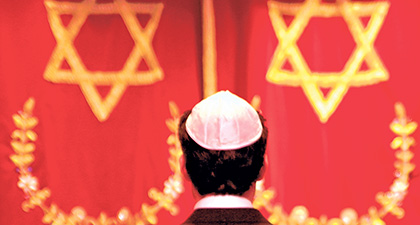Can a rabbi intermarry? This is the question. The issue is complicated and rich; it is controversial and divisive. If my email inbox is any indication, the passions run high.
See also:
Do intermarried rabbis have a future?
Rabbis should be role models
Dating as a rabbinical student or rabbi, especially as a woman, presents enormous challenges. I met my husband in my last year of rabbinical school, so I know this first-hand. Even among liberal Jewish circles, Shabbat observance, both Friday and Saturday, was a hard sell: “So what’s your weekend like?” he asked, sitting across the table at a Lower Manhattan Starbucks.
“Friday night I’m on the pulpit for Kabbalat Shabbat services,” I responded. “Saturday morning, there’s a bar mitzvah, and Sunday morning, there’s family programming at the Hebrew School, and maybe a hospital visit thrown in somewhere in between.”
“Really?” responded this intelligent, Jewishly conscious man. “I have a cottage outside New York. I work hard all week so I can be there by 4 p.m. on Friday. Does that mean you will not be able to join me?”
I stared at my cup of coffee and realized that between my Jewish professional commitment and the social demands of relationships, there lay an ocean.
The Reconstructionist movement is tiny. The congregations within it are also, for the most part, small. Only a handful of synagogues have memberships of more than 500 households. Within the liberal Jewish spectrum, Reconstructionist Judaism is certainly the minority. Take for example, the Reform movement, which has 101 affiliate congregations in New York state alone. The Reconstructionists? One hundred and five across the entire world. The 2014 graduating class of the Reconstructionist Rabbinical College was six students.
In other words, the conversation about this is a lot bigger than the issue itself. Why the controversy, then?
Proponents of ordaining intercoupled rabbinical students argue that intermarried rabbis are likely to be more successful in attracting and integrating interfaith couples into the Jewish world. I would like to challenge this idea. I have been working with interfaith couples for the last 20 years, and I can say, both as a rabbi and as a family therapist, that the identity of a rabbi’s partner has little to do with his or her ability to engage interfaith families in Jewish life. Working in private practice, as well as in New York at the 92nd Street Y, the JCC, a Reform synagogue in Brooklyn, and in Toronto at my current pulpit at Congregation Darchei Noam, I have noticed over the years that people are searching for a place with no judgment. A place of Jewish meaning where they feel pastorally understood and communally stimulated. They are looking for communities that share their values. And, above all, they are looking for Jewish experiences.
Interfaith families come to Jewish institutions to foster their Jewish identities. They are here to learn; they are here to share life’s joyous moments; they are here for support while they grieve. It is the job of the rabbi, and one that I take very seriously, to acknowledge the unique identity of all of the members of the community – whether they come from a Jewish background or not. The rabbi becomes, for his or her congregation, a mentor.
What matters most is the ability to build a bridge. Empathy, understanding, real engagement in people’s lives and deep respect for their stories is what fosters integration. What we know is that integration is currently working better than it ever has, as rabbis across the liberal movements, along with their communities, open doors and their embrace to the diversity of Jewish life and experiences.
The skills to work with intermarried couples are expected of pulpit rabbis in congregations across North America. Even Orthodox rabbis come face to face with these issues. How do we know that integration is working? The numbers tell us. We see a growing number of children of intermarriages who identify as Jewish – the Pew Research Center’s fantastic 2013 Survey of American Jews tells us that.
The number of Jewish life-cycle events – brit milah or milah l’shem gerut (for conversion) ceremonies, baby namings, b’nei mitzvah – of children of intermarried couples keeps growing. Every year, more people in interfaith relationships come into my office seeking support and counsel in order to enhance and deepen their Jewish life.
In a world of such autonomous choices for liberal Jews who see rabbinic authority on a continuum, when one rabbi disagrees with them, another rabbi who will agree is a Google search away.
The Jewish life of a rabbi has never been meant to be a mirror for his or her community. The rabbi is an example, a model and a guide. To ordain intermarried rabbis just to reflect a growing portion of the Jewish community does not answer or solve the issues at hand.
Rabbi Tina Grimberg is the rabbi at Congregation Darchei Noam, the Reconstructionist synagogue of Toronto.
